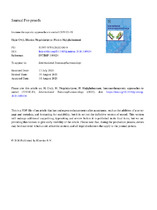Mostrar el registro sencillo del documento
Immunotherapeutic approaches to curtail COVID-19
| dc.creator | Owji, Hajar | |
| dc.creator | Negahdaripour, Manica | |
| dc.creator | Hajighahramani, Nasim | |
| dc.date.accessioned | 2020-08-27T16:48:06Z | |
| dc.date.available | 2020-08-27T16:48:06Z | |
| dc.date.created | 2020 | |
| dc.identifier.issn | 1567-5769 | spa |
| dc.identifier.other | https://doi.org/10.1016/j.intimp.2020.106924 | spa |
| dc.identifier.uri | http://hdl.handle.net/20.500.12010/12346 | |
| dc.description.abstract | COVID-19, the disease induced by the recently emerged severe acute respiratory syndrome coronavirus 2 (SARS-CoV-2), has imposed an unpredictable burden on the world. Drug repurposing has been employed to rapidly find a cure; but despite great efforts, no drug or vaccine is presently available for treating or prevention of COVID-19. Apart from antivirals, immunotherapeutic strategies are suggested considering the role of the immune response as the host defense again the virus, and the fact that SARS-CoV-2 suppresses interferon induction as an immune evasion strategy. Active immunization through vaccines, interferon administration, passive immunotherapy by convalescent plasma or synthesized monoclonal and polyclonal antibodies, as well as immunomodulatory drugs, are different immunotherapeutic approaches that will be mentioned in this review. The focus would be on the two latter topicspassive immunotherapeutic interventions. Interferons might be helpful in some stages. Vaccine development has been followed with unprecedented speed. Some of these vaccines have been advanced to human clinical trials. Convalescent plasma therapy is already practiced in many countries to help save the lives of severely ill patients. Different antibodies that target various steps of SARS-CoV-2 pathogenesis or the associated immune responses are also proposed. For treating the cytokine storm induced in at a late stage of the disease in some patients, immune modulation through JAK inhibitors, corticosteroids, and some other cognate classes are evaluated. Given the changing pattern of cytokine induction and immune responses throughout the COVID-19 disease course, different adapted approaches are needed to help patients. Gaining more knowledge about the detailed pathogenesis of SARS-CoV-2, its interplay with the immune system, and viral-mediated responses are crucial to identify efficient preventive and therapeutic approaches. A systemic approach seems essential in this regard. | spa |
| dc.format.extent | 44 páginas | spa |
| dc.format.mimetype | image/jepg | spa |
| dc.language.iso | eng | spa |
| dc.publisher | International Immunopharmacology | spa |
| dc.source | reponame:Expeditio Repositorio Institucional UJTL | spa |
| dc.source | instname:Universidad de Bogotá Jorge Tadeo Lozano | spa |
| dc.subject | COVID-19 | spa |
| dc.subject | Pandemic | spa |
| dc.subject | Severe acute respiratory syndrome coronavirus 2 | spa |
| dc.subject | Antibodies | spa |
| dc.subject | Plasma therapy | spa |
| dc.subject | Immunotherapy | spa |
| dc.title | Immunotherapeutic approaches to curtail COVID-19 | spa |
| dc.type.local | Artículo | spa |
| dc.subject.lemb | Síndrome respiratorio agudo grave | spa |
| dc.subject.lemb | COVID-19 | spa |
| dc.subject.lemb | SARS-CoV-2 | spa |
| dc.subject.lemb | Coronavirus | spa |
| dc.rights.accessrights | info:eu-repo/semantics/embargoedAccess | spa |
| dc.type.hasversion | info:eu-repo/semantics/acceptedVersion | spa |
| dc.rights.local | Acceso restringido | spa |
| dc.identifier.doi | https://doi.org/10.1016/j.intimp.2020.106924 | spa |
| dc.type.coar | http://purl.org/coar/resource_type/c_2df8fbb1 | spa |

